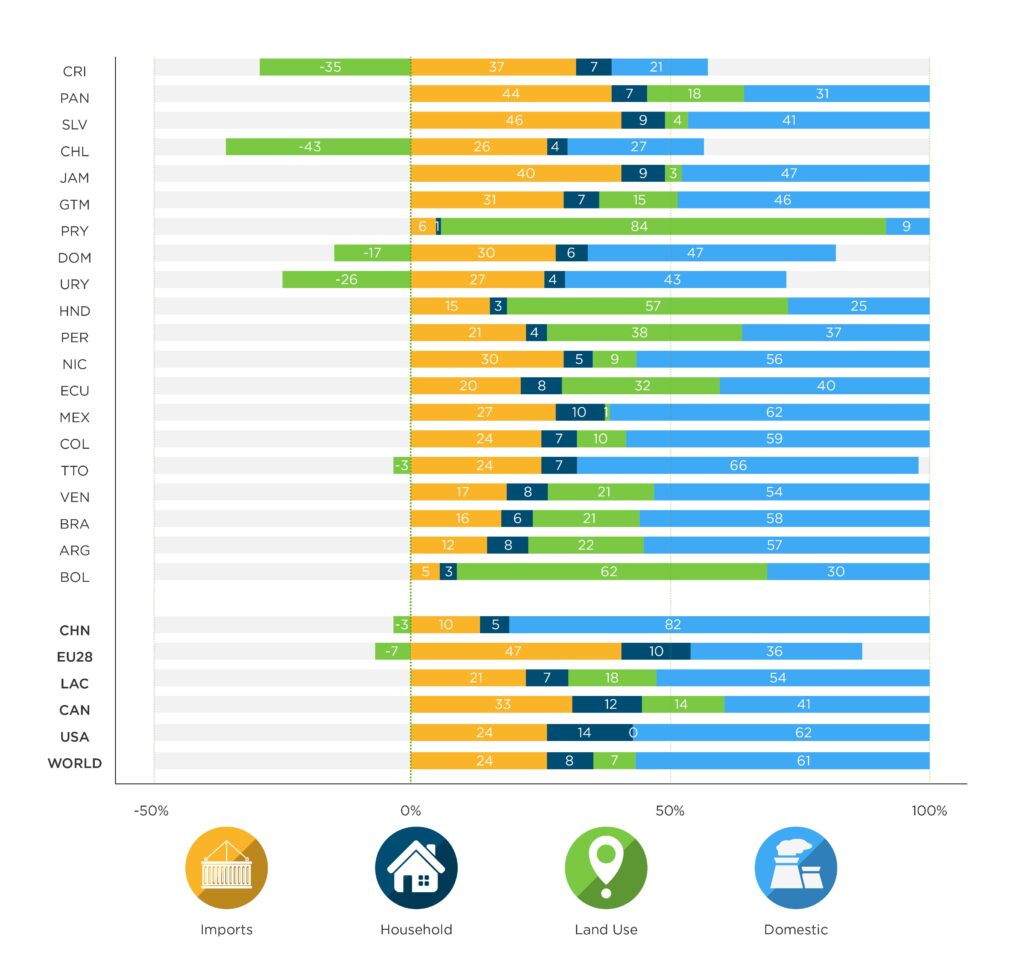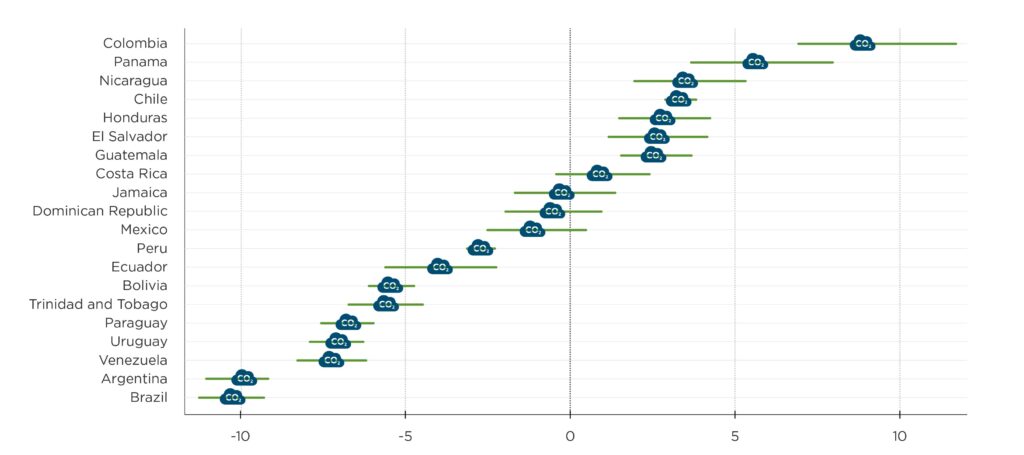Like their colleagues around the world, trade ministers in Latin America and the Caribbean (LAC) can barely get a break these days. Backlashes against globalization at home and abroad were swiftly followed by a public health crisis and geopolitical tensions that revived long-dormant calls for protection. As if that wasn’t enough, trade policy has also been called to play a role in a growing climate crisis, the social and economic impacts of which are potentially devastating, particularly for tropical regions such as much of LAC.
Unsuspected analysts suggest that this role should be pursued no matter the costs: “saving the planet is more important than the trading system.” But can trade policy really save the world? Can it be done without further undermining the gains from trade, a key driver of the region’ and world’s prosperity in the last three decades?
The most talked-about proposal—a carbon border tariff–suggests a negative answer for both questions. This tariff, levied according to the imports’ carbon content, aims at fixing an undesirable consequence of the world’s failure to harmonize carbon pricing across borders–investments flowing to countries with lower fossil fuel taxes, aka “carbon leakage.” However, most studies suggest that such scheme would have a small impact on global CO2 emissions and would pose an additional threat to an already troubled global trade system.
Are there more hopeful alternatives? Joseph Shapiro’s insights about tariff reform seems particularly appealing as it offers policymakers a better chance to balance environmental and efficiency objectives. His findings suggest that trade policy in most countries provide a subsidy to emissions because tariffs favor trade in emission intensive goods. Think of intermediate goods such as aluminum, steel, or cement.
The solution to eliminate this bias would be tariff harmonization—i.e., to have the same tariffs for all sectors. This is an initiative that can be carried out unilaterally, without necessarily hurting World Trade Organization or preferential trade agreements (PTAs) principles or commitments. What is in it for LAC policymakers?
To answer this question, we conducted a detailed study of the impact of an emission-guided tariff reform for 20 countries in the region. We use data on direct and indirect embodied emissions of greenhouse gases (GHG, measured in CO2 equivalent units) in these countries’ domestic outputs and imports.
Carbon footprint
What we find is, first, that LAC’s trade has a carbon footprint large enough to merit a policy discussion, but low enough to dampen expectations about trade policy saving the world. GHG embodied in goods imported by LAC accounts for 21% of the region’s consumption emissions – including production and domestic and international transport – , but bear in mind this figure varies significantly across countries (figure 1). They are also likely to be a lower bound–particularly for those that export natural resources–because the link between trade emissions and land use and deforestation cannot be traced accurately.
Figure 1 – Share of Trade-Related GHG Emissions. Consumption Accounting

Note: Countries ranked according to their share of imports in emissions, excluding land use and household emissions. A negative value means that changes in land use reduced rather than increased emissions. Domestic emissions are those produced and consumed domestically. Imports emissions are those produced abroad and consumed domestically.
The role of trade policy
The second set of findings focuses on trade policy’s contribution to this footprint. This is shown in figure 2, which plots the correlation between tariffs and the imports’ emission intensity. At least half of the countries in the sample have lower tariffs for “dirty” goods, that is, those whose production and transportation is intensive in emissions. The other half have either a neutral stance or higher protection for these goods.
A negative (positive) correlation can be interpreted a subsidy to (a tax on) trade emissions. For instance, Argentina and Brazil have some of the highest subsidies in the region (US$ per metric ton of CO2e), whereas Colombia has some of the highest taxes (US$ 9 per metric ton of CO2e).
To put these figures into perspective, recent estimates of the social cost of CO2 range from US$56 to 83 per metric tons. Trade policies in the region are either pushing countries in the wrong direction or making a modest contribution to closing the gap between the private and social costs of carbon.
Figure 2 – LAC’s Tax and Subsidies on Trade Emissions. US$ per ton of CO2e.

Note: The left-hand side variable is applied tariffs and the right-hand side variable is total emission intensity (CO2e per dollar of output). Point estimates are represented by the clouds and green bars represent the 95% confidence interval.
What to expect from tariff reforms?
The third set of findings concerns tariff reforms. This is where things get complicated. The interpretation that a negative bias toward dirty goods is a subsidy requires the assumption that goods produced at home are cleaner than those coming from abroad. That is not always the case. According to our estimates, replacing imports by domestic output would increase emissions in as much as 22% of LAC trade relationships, which account for 33% of the region’s trade.
There are also other complications arising from jurisdictional and efficiency trade-offs. By eliminating the bias towards imports of dirty goods, governments might be lowering global emissions but increasing emissions at home. This would undermine their commitments to the Paris Agreement, not to mention the collateral effects it would have on local air pollution.
Likewise, eliminating emission biases by tariff harmonization might imply raising protection to noncompetitive sectors, which already enjoy relatively high protection in some of LAC’s largest economies. This would worsen resource allocation, causing the negative effects on welfare and growth that are well-documented.
One way to avoid these non-desirable collateral effects would be to combine tariff harmonization with trade liberalization. For instance, convergence to the OECD’s average tariff would make sure that the reform would steer clear of prohibitive efficiency costs.
In any event, even if tied with liberalization, it is important to get the expectations right. Since trade emissions, as shown, are, in most cases, just a fraction of the countries’ overall emissions, even a well-designed tariff reform is bound to have a limited impact.
Rather than messing with trade policy, a significantly better option would be to address what is arguably the elephant in the room: fossil fuel prices well below the socially optimum, made worse by generous subsidies. They currently stand at 1% of the region’s GDP, but can get as high as 12.5% in Venezuela, 2.6% in Ecuador, and 1.6% in Mexico and Argentina.


Leave a Reply